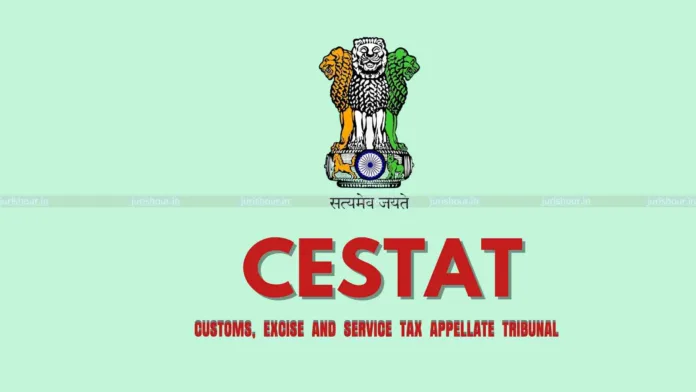The Mumbai Bench of Customs, Excise and Service Tax Appellate Tribunal (CESTAT) while allowing the Cenvat Credit of Rs. 2.94 lakhs held that Service Tax Law and Cenvat Credit Rules does not specify time limit for which input service invoices are to be maintained.
The bench of Anil G. Shakkarwar (Technical Member) has observed that the input service invoices were pertaining to the years 2013, 2014 and 2015 and they were attempted to be produced in the year 2021 before the original authority and the appellant could establish a case of Rs.5.69 crores and could not produce invoices having service tax payment to the tune of Rs.2.94 lakhs. It appears to me that it is a genuine case where some invoices could not be traced out.
The appellant/assessee was engaged in providing multi system operator (MSO) of cable distribution who received programming services from its broadcasters or their agents and they transmitted the same for simultaneous reception either by multiple subscribers directly or through one or more cable operators or agents of cable operators. They were registered with Service Tax.
Appellant filed an application in the VCES scheme for the period ending December 2012. Revenue initiated enquiries against the appellant. It was noticed by the department that the appellant booked turnover during the financial year 2012-13.
The department noticed that turnover of the appellant for the period from 01.01.2013 to 31.03.2013 was Rs.6,66,50,205 which was declared in ST-3 return filed on 27.01.2017. During the year 2013-14 appellant booked their turnover in their P&L account as Rs.11,73,62,203/- whereas they declared their turnover of Rs.9,65,80,347 in ST-3 return and as a result, it appeared to Revenue that assessable value to the tune of Rs.2,07,81,856/- skipped levy and payment of service tax to the tune of Rs.25,68,637/-.
It was also noticed by Revenue that during the year 2014-15 appellant booked in their P&L account business turnover of Rs.15,78,21,960/- whereas the service tax was paid on assessable value of Rs.15,74,92,662/- thereby no service tax amounting to Rs.40,701/- was paid on difference of Rs.3,29,298/-. Therefore, it appeared to Revenue that the appellant had short paid service tax amounting to Rs.26,09,338/- during the period 2013-14 to 2014-15. It was also appeared to Revenue that the appellant had availed and utilized cenvat credit of Rs.5,77,58,121/- without having any prescribed documents for availing the same since they could not produce documents before the enquiry officers.
Therefore, a show cause notice dated 07.09.2018 was issued to the appellant through which service tax of Rs.26,09,338/- was demanded by invoking proviso to sub- section (1) of Section 73 of Finance Act, 1994. Further there was a proposal to deny cenvat credit of Rs.5,77,58,121/-. Further there was a proposal to appropriate Rs.5,00,000/- paid by the appellant towards interest on delayed payment of service tax. On contest, the said show cause notice was adjudicated through impugned order-in-original.
The original authority observed that there was a typographical mistake on the part of the appellant and, therefore, the demand raised in the show cause notice for disallowance of input service credit was to the extent of Rs.4,93,23,732 whereas the same should be restricted to Rs.2,93,23,732. The said amount of Rs.4,93,23,732/- is a component of Rs.5,77,58,121/-. Appellant in the year 2020-21 produced available input service invoices for the period from January 2013 to March 2015 and on the basis of the same, the original authority has allowed cenvat credit to the appellant and held that the appellant could not produce invoices covering cenvat credit amounting to Rs.7,59,549/- and, therefore, disallowed the cenvat credit through the impugned order by dropping the demand of Rs.5,69,98573. He has confirmed the demand of service tax of Rs.26,09,338/- and appropriated an amount of Rs.11,80,034. He has also ordered the appellant to pay interest and imposed a penalty.
The CESTAT held that the original authority has very clearly stated that the appellant had filed ST-3 returns wherein the assessable value was shown to the tune of Rs.9.65 crores and Rs.15.74 crores. There was a difference between the assessable value shown in the ST-3 return and the turnover in the P&L account, but there was no ntention not to pay service tax on the balance amount because balance involved service tax of merely Rs.11 lakhs.
Case Details
Case Title: Bhima Riddhi Digital Services Versus Commissioner of CGST & CE, Pune-II
Case No.: Service Tax Appeal No. 86765 of 2021
Date: 04/06/2025
Counsel For Appellant: V.M. Doiphode
Counsel For Respondent: A.P.S. Parihar
Read More: Purchasing Dealer Can’t Be Denied GST ITC For Selling Dealer’s Default: Allahabad High Court

